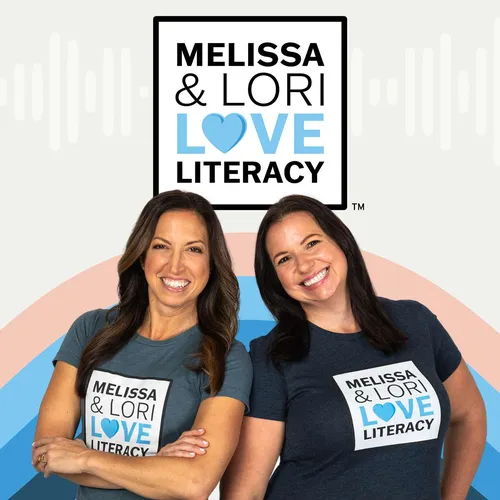
Melissa & Lori Love Literacy ®
Melissa & Lori Love Literacy® is a podcast for teachers. The hosts are your classroom-next-door teacher friends turned podcasters learning with you. Episodes feature top literacy experts and teachers who are putting the science of reading into practice. Melissa & Lori bridge the gap between the latest research and your day-to-day teaching.
- Update frequency
- every 6 days
- Average duration
- 51 minutes
- Episodes
- 317
- Years Active
- 2019 - 2025

Ep. 58: Looking for Change in Laramie
Tiffany Rehbein, K-12 English Language Arts Coordinator from Laramie County School District in Cheyenne, Wyoming shares why and how the district shifted to HQIM. After seven years of stagnant ELA sco…

Ep. 57: Reflecting on the School Year with Grade 3 Teacher Natalie Baggett
As a new teacher in Sumner County, TN, Natalie Baggett saw the desperate need for high quality instructional materials. In her first semester teaching, she scrambled to create instructional materials…

Ep. 56: What are THE ELEMENTS needed to transform teaching and professional learning?
What are The Elements needed to transform teaching and professional learning? What will accelerate success towards equity and excellence? What are considerations for professional learning across the …

Ep. 55: The Science of Reading as Policy with Kymyona Burk
Kymyona Burk is the Policy Director for Early Education at ExcelinEd, where she supports states pursuing a comprehensive approach to K-3 reading policy through successful policy implementation. She g…

Ep. 54: How can school leaders support teachers in Year 1 HQIM implementation?
Wondering how school leaders can support teachers in this work? Jovanni Ramos is a former school leader from NOLA and champion for supporting teachers using HQIM!
Jovanni set teachers up for success…

Ep. 53: Making the Shift to a Content Focused Curriculum with Rachel Arnold
Rachel Arnold is an intervention and special education teacher at Clayton, ES in Colorado. Her journey to HQIM began when she asked herself the question: How can we use the science of reading resear…

Ep. 52: Universal Design for Learning is INVISIBLE EQUITY in HQIM
UDL is invisible when done well in HQIM! In this episode, Sue Sabella and Vivian Nourse share how HQIM are designed with UDL embedded within. See below for a quick refresher of the three principles …

Ep. 51: The Science of Reading: An Equity Issue
Educator Shanita Rapatalo shares how "literacy, liberation, and opportunity go hand in hand" both on the podcast and in her recent blog post located here. She discusses the mindset shifts needed to …

Ep. 50: Anti-bias & Anti-racist Approach to HQIM at KIPP SOCAL with Daisy Salazar-Garza
Meet Daisy Salazar-Garza, an incredibly thoughtful school leader at KIPP SOCAL, who shares her anti-bias and anti-racist approach to implementing Wit & Wisdom ELA.
- How is Wit & Wisdom aligned to KIPP…

Ep. 49: The Science of Reading Goes to College
Mount St. Joseph in Cincinnati, Ohio considers science of reading research the backbone of their programming at all levels: undergraduate, graduate, and doctoral. On today's episode, we talk with Amy…

Ep. 48: Behind the Scenes at EdReports.org
What goes on behind the scenes at EdReports.org? Tricia Parker and Jess Box share the gateways that EdReports uses to reviews curricula: standards alignment, quality, and usability. We ask the questi…

Ep. 47: Jackson's Journey to HQIM with Supt. Dr. Errick L. Greene
Dr. Errick L. Greene, Superintendent of Jackson Public Schools, shares the district's transformation journey and how he level sets on what excellence looks like:
- HQIM
- Seeing is believing
- Professional l…

Ep. 46: Chatting with The Reading League's Laura Stewart
Laura Stewart from The Reading League discusses evidence-aligned instruction to support universal understanding around the science of reading. She discusses how practice CAN transform belief to help …

Ep. 45: RivetED Talks High Quality Professional Learning (HQPL)
How is professional learning is different with HQIM? How do we define high quality professional learning (HQPL)? Why should HQPL be content focused? Who is best suited to provide support for implem…

Ep. 44: Elevating the Education Profession with The Right to Read Project
Margaret Goldberg & Lani Mednick from The Right to Read Project share why we should give equal importance to the ENTIRE reading rope (Scarborough's Reading Rope)!
We ask some tough questions, includin…

Ep. 43: A Knowledge-Based Approach to Writing: The Vermont Writing Collaborative
Joey Hawkins & Diana Leddy of The Vermont Writing Collaborative share how educators can support students in creating and communicating their understanding through writing.
The three pillars for writi…

Ep. 42: Why should we teach social studies?
Adam Tyner, Associate Director of Research at the Thomas B. Fordham Institute, joins us to unpack his recent research findings on Social Studies Instruction and Reading Comprehension: Evidence from t…

Ep. 41: HQIM + Primary Grades: The Inside Scoop from Two Primary Teachers in Baltimore
How do primary teachers take a 'both and' approach to literacy - building foundational skills for word recognition alongside knowledge and vocabulary for language comprehension?
Jen & Sam, two primar…

Ep. 40: See ya 2020! Welcome 2021!
Melissa and Lori reflect on the highs and lows of 2020, and share who they'd like to pod with in 2021! Join us to reflect and reset as we begin the new year.
Visit OUR WEBSITE to subscribe to our ne…

Ep. 39: Discussing Dyslexia with Advocate & Mom Liz Hembling
Liz Hembling's daughter, Mia, attended a public elementary school. Liz noticed early on that she struggled terribly learning to read. In second grade, the school placed Mia in a remedial reading grou…